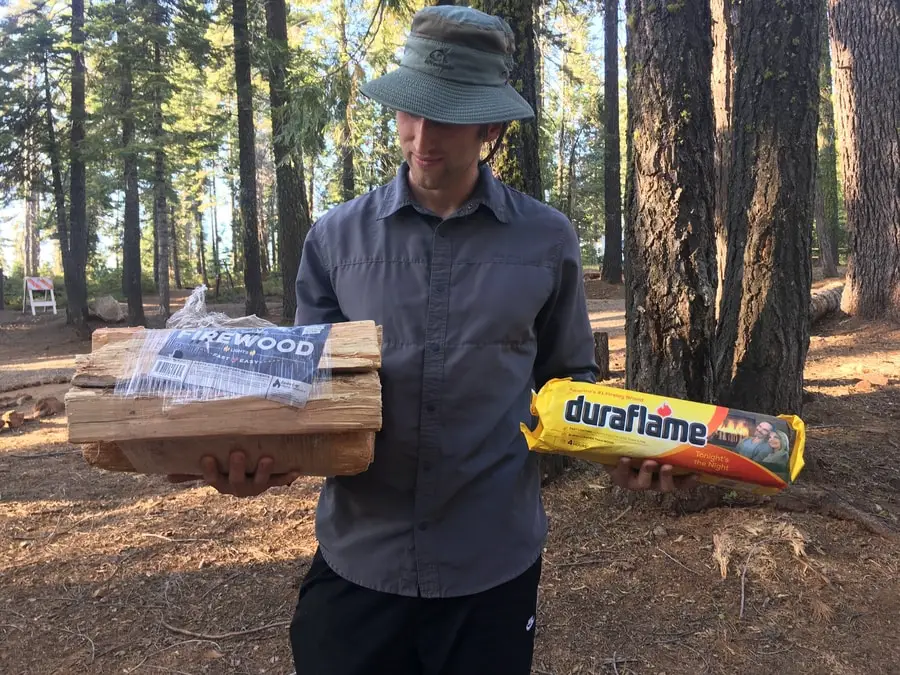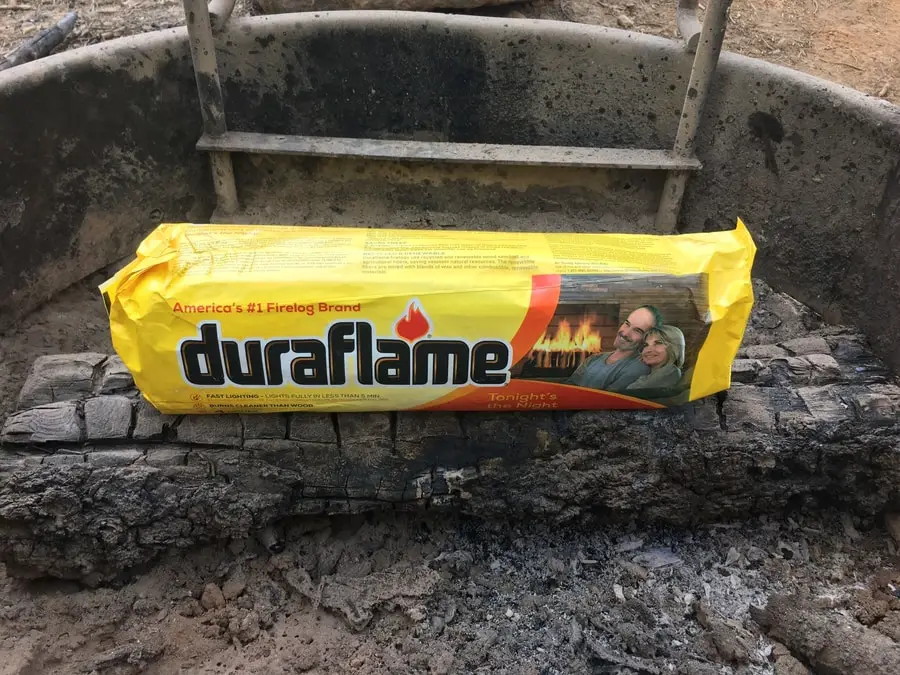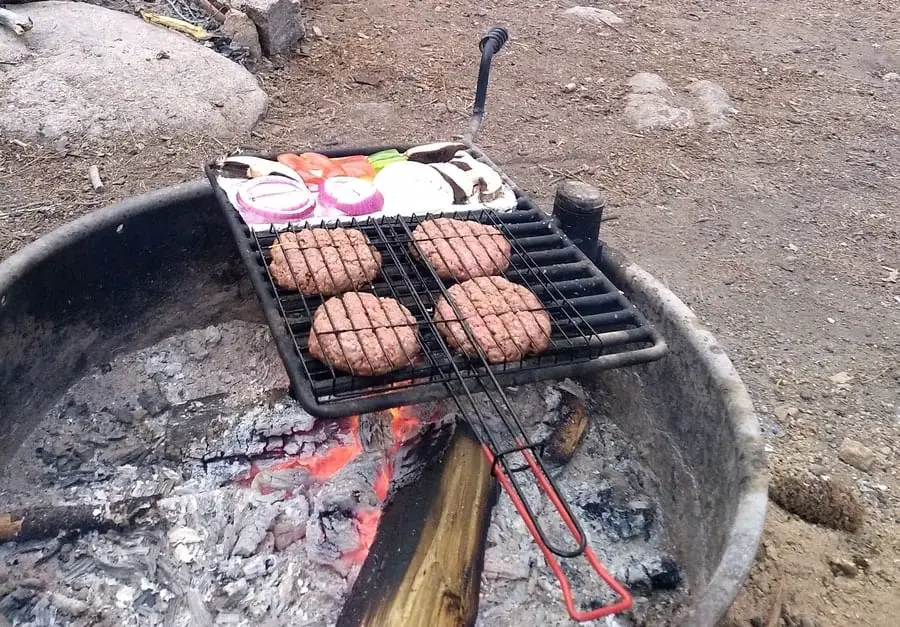
Having a campfire is great. It provides a means of cooking food, a means of keeping you warm, and a means of bringing people together. Have you ever wondered if you were using the right materials to build your campfire? There are fire logs and then there is regular firewood. Which one is better for your next campfire? In this post, I will compare the advantages and disadvantages of using fire logs vs firewood.
So, what’s better, fire logs or firewood? In some situations, fire logs are better than firewood for campfires because they hold some distinct advantages over regular firewood. Ask yourself some of these questions:
- Which option is better for the environment?
- Which one will keep you warmer?
- Which one is the most cost-effective?
- Which one is better for cooking?
- Which is best for your next trip?
By the way, If you are in the market for a new camping stove, then you should click here to see the one I recommend on Amazon.
Which option is better for the environment?
We are concerned about our environmental impacts more than ever before. This is an important factor to consider when choosing what to burn in our campfire. Most of us know the basics like we shouldn’t be burning our plastic trash, but what about the firewood itself?
As it turns out, burning firelogs is better for the environment than burning regular wood. For starters, the firelogs are mostly made from recycled material consisting of things such as recycled wood, waxes, and oils, among other things. Firewood is just cut down trees. So the artificial firelogs are more sustainable in regard to the use of renewable resources, which benefits the environment.
Another benefit that firelogs have over regular firewood for the environment is the amount of “pollutants” released from burning them. Artificial logs are known to release 80% less fine particles than firewood, 75% less carbon monoxide than firewood, and 90% less hazardous air pollutants. That all sounds great right, but there’s more. These logs put out much less smoke and that can make for a better experience as well as a better environmental impact.
Firewood produces a lot of smoke when it is burning and the density can vary based on the type of wood being burned. Firewood smoke can be harmful to our bodies with too much contact. It always seems like the smoke follows you wherever you move around the campfire too. Even if there is no wind, the smoke somehow finds you shortly after you have moved your chair to a different location. The smoke released is pollution in the air and artificial logs put out significantly less smoke compared to regular wood.
Environmental winner: artificial fire logs.
Which one will keep you warmer?

To answer this question we must know which one gives off more BTU (British Thermal Units) which is just a measurement of heat. The textbook definition tells us that BTU’s are defined as “the amount of heat required to raise the temperature of one pound of water by one degree Fahrenheit.” but that doesn’t really matter to us. On average, the firelogs will burn twice as hot as the equivalent amount of firewood. Firelogs produce about 16,000 BTUs while regular firewood comes in at about 8,000 BTUs. So technically, firelogs will keep you warmer than firewood with half the size.
Firelogs will also burn for much longer than regular wood. Most good-sized firelogs can last up to 4 hours, and small fire logs last 3 hours. I have never had one piece of firewood of the equivalent size last that long, maybe 2 hours tops. You need more wood in order to get the same amount of heat, but with firewood, you can also get a roaring fire going, firelogs usually produce smaller but hotter fires.
Warmth winner: artificial fire logs.
Which one is most cost-effective?
The answer to this question can change depending on where you live. After all, the price of firewood will change drastically based on your location because of wood availability. Firelogs, on the other hand, have a more fixed price. As an example, where I live a small bundle of wood is typically about $6. That might sound about right to you, or it might sound outrageously high, it just depends. I can get a single firelog for around $4 that can suit my needs for one night when all I need is a small fire to keep me warm and occupied.
On average, the firewood will cost less than firelogs. This is obviously dependent on where you live, but check out some fire log prices online because you can buy them in bulk and get a very good price on a per log basis. Also, consider storage and transportation too. Firelogs are easy to store and transport and they don’t produce as much of a mess like regular firewood does. If I store any firewood in my garage then I have to clean up a lot of sawdust and small wood pieces later. If I store fire logs then they stay nice and neat in their box and they come wrapped.
Cost winner: firewood (depending on where you live)
Which one is better for cooking?

Nothing beats cooking some food on a campfire. You have so many options such as wrapping food in aluminum foil and throwing them into the fire to putting something on a stick and roasting it over the fire. Both fire logs and firewood will get the job done, but with firewood, you can get a bigger fire that is more suitable for cooking.
Unless you are using a bunch of fire logs (which could be expensive) the mass of the fire not be well suited for cooking on the fire. Wood, on the other hand, produces the perfect environment for cooking food. All the classics like smores and weenies on a stick are meant to be cooked over regular firewood. Sometimes the smoke produced by the firewood gives that irresistible smokey flavor too.
Cooking winner: firewood
Which one should I purchase for my next trip?
Well, that is up to you, but think about your situation and which would suit you better. The great thing about firelogs is their long term storage. You can buy a large box of them and they will be ready to go at any time, and they don’t take up much space or create a mess. Here are some things to help you determine if you should take fire logs or firewood on your next camping trip:
Will you be camping in a group? 4+
If so then maybe you should get some regular firewood because groups tend to stay around the campfire longer and need bigger fires. It is a classic camping scene to have a roaring fire going when camping in a group. If you are not going to be in a larger group such as being by yourself or as a couple then you only really need fire logs. You may only need to use one per night because they burn for a long time (4 hours usually) and put out plenty of warmth. It is also easy to bring them along in the car because they are clean and take up little space.
Are you going to be doing any cooking over the campfire?
If you are then maybe you are better off with some real firewood. After all, you are gonna need a bigger fire in order to but the food into the fire or hand it over the fire. If you are just gonna be using a camping stove or doing something simple like roasting marshmallows then you can easily get away with just having fire logs for your trip.
How cold is it going to be when you go camping?
If you are using regular firewood then you will need a lot more to get the same amount of warmth because pound for pound the artificial fire logs are going to put out more warmth. If it’s not going to be that warm then you don’t need a very large fire and therefore one fire log might be right for you.
Are you environmentally conscious or strongly affected by smoke?
Then you are better off going with the fire logs. Be sure to read closely what brand you are getting because not all fire logs are created equal. There are some that use 100% environmentally friendly material and there are some that only use some environmentally friendly material, so read the labels carefully if that is a concern for you.
Conclusion
You can’t go wrong with choosing artificial fire logs in most camping circumstances unless you are going to be cooking over the fire or in a larger group. Take all factors into consideration in order to figure out which ones matter to you the most. If it is the environment then choose fire logs. If it is warmth then choose fire logs, if it is cost then choose firewood (depending on your location), and if it is campfire cooking then choose firewood.
No matter what you choose, there is nothing like sitting around a campfire in the outdoors and just enjoying the moment.
My Favorite Camping Gear
- Air Mattress: click here
 to check out my favorite on Amazon.
to check out my favorite on Amazon. - Tent: click here
 to see my favorite tent available on Amazon.
to see my favorite tent available on Amazon. - Sleeping Pad: click here
 to check out the one I love on Amazon.
to check out the one I love on Amazon. - Sleeping Bag: click here
 to see the one I recommend on Amazon.
to see the one I recommend on Amazon. - Camping Stove: click here
 to see the best camping stove on Amazon.
to see the best camping stove on Amazon.


